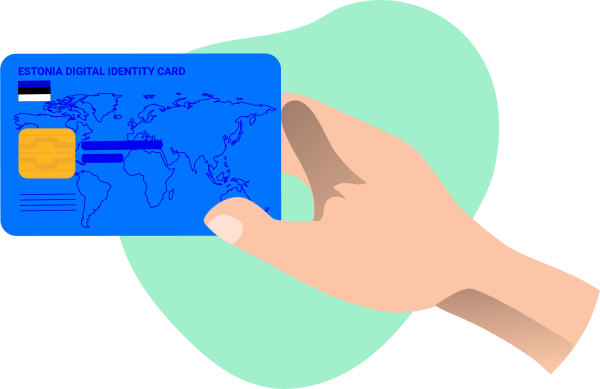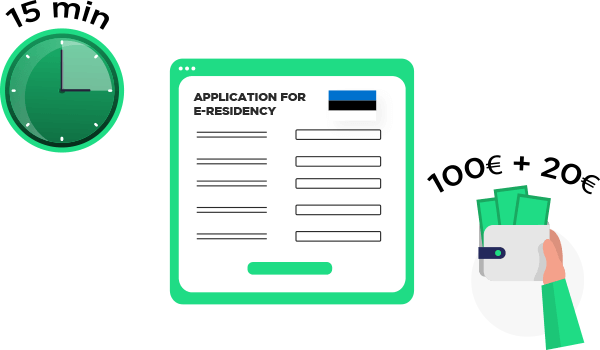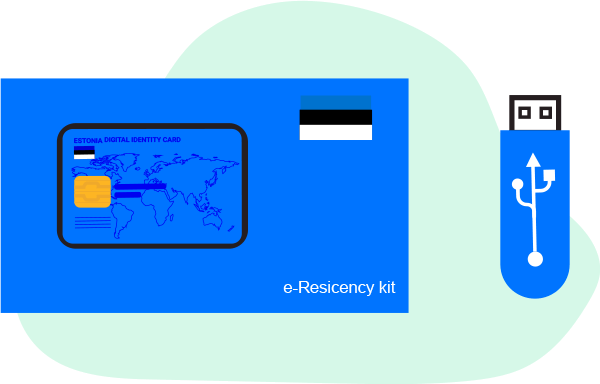
A guide to starting a business in Estonia as a non-citizen
If you’ve thought about opening a new business somewhere with plenty of government support, expanding your business into the EU, or making it easier to work as a contractor or digital nomad anywhere in the European Economic Area (EEA), you probably should start a business in Estonia.
Estonia is a popular country for entrepreneurs, digital nomads, contractors and freelancers, thanks to its streamlined, low-cost system for registering new businesses as a non-citizen, support for the entrepreneurial spirit, rapidly developing economy, and position as part of the EU.


Owning a business in Estonia means that you can get paid more easily by European clients, sell products online in European marketplaces, and work smoothly with suppliers and partners anywhere in the EU. That’s why we’ve put together this guide to starting a business in Estonia as a foreigner.
Can foreigners start a business in Estonia?


Yes! The Estonian government is very supportive of entrepreneurs and business owners, so it’s easy and simple to open an enterprise in the country. There’s a streamlined process for opening a business in Estonia, and you can do it all online without ever setting foot in the country.
What you should know before you start a business in Estonia
Before you start a business in Estonia, you’ll need to get e-residency. Although it sounds like it involves living in Estonia, it’s not a residency permit and it doesn’t give you Estonian citizenship. It’s more like a digital tool that you can use to open a company, manage your business, and pay taxes.


It’s worth noting that you don’t have to get e-residency. You can instead apply for a visa to become an actual resident of Estonia, but that costs more and takes longer to process.
1. Apply for e-residency
The first step is to become an e-resident. The application form is online and takes about 30 minutes to complete. You’ll need to briefly explain why you want to open a company in Estonia using e-residency and pay an application fee of EUR100. Depending on the location of pickup, there may be an additional pick-up fee of EUR30. The government promises a reply within 30 days, but it’s usually less.


Note: every owner of your business needs to be an e-resident in their own right. If you’re running a company with a partner, or you’re a startup with a few founders and investors, each of you has to get e-residency separately.
2. Pick up your e-residency digital ID card
Once your application is approved, you’ll pick up the e-residency starter kit from a nearby location. You can choose your preferred location online as part of the application process. The kit includes:
- Your digital e-resident ID card, which you can use to register a business, pay taxes, and more online;
- A digital USB card reader, access codes and an access stick, so you can use your card to authenticate your identity and carry out business activities online.


When you pick up the kit, an official will also record your fingerprints as part of Estonia’s anti-fraud practices.
3. Arrange a local address and contact person
Once you have e-residency, you can apply to start your business in Estonia. Don’t worry, it’s all online! Before you apply, you will need:
- A physical address in Estonia, which can’t be a residential address
- A local contact person


There are plenty of service providers who’ll carry this service out for you. Choose one from Estonia’s e-residency marketplace. It usually costs around EUR 30-150 per month, depending on additional services like accounting and bookkeeping.
What types of companies can you register when you start a business in Estonia?
Estonian law recognizes 6 kinds of company registration:
- Private limited company
- Public limited company
- Sole proprietor
- General partnership
- Limited partnership
- Commercial association
Here’s some more information about each kind of enterprise, to help you choose the best option for your business.
Private limited company
This is the most popular type of company, because it’s flexible, limits exposure to risk, and doesn’t require much capital. A private limited company is called osaühing in Estonian, but usually abbreviated to OÜ. It’s appropriate for contractors and freelancers working alone, and for small groups of people running a business together.
An OÜ has to have a management board, but that board can have just one member and that member can be you! Many OÜ companies in Estonia have only one employee and board member, which is why it’s so popular for contractors and sole traders.


As of February 1, 2023, the Estonian Commercial Code and the Business Registry Law will undergo significant changes. These revisions will provide new opportunities for Estonian companies, including the removal of the minimum share capital requirement for Private Limited Companies (Est. Osaühing). This means that you only need to commit to investing 1 euro cent in your OÜ, and you don’t have to pay it upfront; you can pledge to invest it within 10 years.
With an OÜ, your personal assets are only at risk for the capital you invest, making it an attractive option for entrepreneurs testing business ideas without risking all their finances.
Public limited company
This is similar to a private limited company, but it’s publicly traded and the minimum share capital is EUR 25,000. It’s called an aktsiaselts in Estonian, but that’s normally shortened to AS.
An AS is a good choice if you already run a successful business with a reliable turnover and a number of business partners and you want to expand into the EU.
Sole proprietor
If you’re running a business all by yourself or you’re a freelancer, you can register as a sole proprietor, or FIE. But most sole traders in Estonia register as a private limited company instead, because it’s so easy and protects them from risk. If you’re a sole proprietor, then you are personally responsible to pay any liabilities associated with the business.


General partnership
A general partnership is a business that you run together with one or more partners. Each one of you needs to be an e-resident. In a general partnership, all the partners are personally liable for any business debts.
Limited partnership
A limited partnership is very similar to a general partnership, but it limits your liability to just the amount of capital you put into the business. This makes it more popular than a general partnership.
Commercial association
A commercial association is a kind of company that lets all the founders and members work together for their joint interests. It’s rare to use a commercial association to start a business in Estonia.


What is the best vertical for opening a business in Estonia?
As long as your business vertical is legal, you can open it in Estonia. Some of the most popular businesses for e-residents are IT services, consultancy, marketing, ecommerce, and logistics.


Some areas of business have more regulations than others. If you want to open a business in a highly regulated industry, like financial services, cryptocurrencies, or construction, you’ll probably need to get a license or submit a Notice of Economic Activity before you start any business activities.
How do I register a company in Estonia as a foreigner?
Once you’ve got e-residency, it’s quick and easy to register your company in Estonia. Here are the steps you’ll need to take:
- Decide what type of business to open
- Go to the Estonian e-business register and complete the online form
- Sign your documents digitally using your digital e-resident ID card
That’s it! It only takes about 15 minutes to complete the form, and your company will be ready in 1 working day. The fee to register a company in Estonia is EUR 265, and most of the information and forms are in English.
Before you start the process of company registration, make sure you have:
- An e-residency ID card
- A copy of your passport, for anti-money laundering regulations
- A local physical address and contact person
Do you need to hire a lawyer to open a business in Estonia?
If you have e-residency, you won’t need a lawyer to start a business in Estonia. You can do it all online without setting foot in the country! But if you choose not to become an e-resident, you will need a lawyer and a notary to open the business for you. It’s more expensive this way, and it takes longer.


The advantages and disadvantages of Estonian e-residency
If you’re still considering whether it’s worth it to get e-residency as part of starting a business in Estonia, here’s a brief overview of the pros and cons.
The advantages of Estonian e-residency
- It makes it smooth, easy, and fast to open and manage a business in Europe
- Support to manage an EU business online from your home
- Low corporate tax, and tax agreements with many countries to prevent double taxation
- Access to valuable business markets in the EU and Eastern Europe
- Low fees for setting up and managing a business
- A digitally advanced economy with fast internet, many business services, and plenty of support for entrepreneurs
- An established startup hub which has produced more unicorns per capita than any other European country
- Most business-related resources are in English
The disadvantages of Estonian e-residency
- You don’t receive any rights as a citizen or a resident, and e-residency is not a visa or give you the right to enter the country
As you can see, the advantages to becoming an e-resident in Estonia are far greater than the disadvantages. In fact, if you want to start a business in Europe as a non-citizen, Estonian e-residency is your best option.
What are your tax and VAT obligations when you own a business in Estonia?
Estonia isn’t a tax haven, so you will have to pay corporate taxes. But its tax regulations are straightforward and reasonable, so record-keeping isn’t a burden.
VAT
If your business has an annual revenue of more than EUR 40,000, you’ll need to register for VAT, issue VAT invoices, and pay VAT to the Estonian government. This applies to every kind of company that’s registered in Estonia.


Like most EU countries, Estonia has a VAT rate of 20%. You can report VAT and pay online using your e-residency card.
Corporate tax
Estonia’s business tax rate is 20%, but that’s only for profits that you take out of the company. If you reinvest your profits into the business, you don’t have to pay any tax at all.
Social tax
Estonia charges a social tax of 33%, similar to social security in the US. If you’re a sole proprietor, or the director of a private limited company, you’ll have to pay this tax.


But Estonia has social security agreements with a number of countries, including the US, Canada, and Ukraine. If you’re already paying social taxes in your home country, you can fill out an A1 form to report that you’re paying this tax at home, and then you won’t have to pay it in Estonia.
Personal income tax
Estonia’s income tax system has seen some changes in recent years. Starting from 2023, the basic exemption for individuals who have not yet reached pensionable age is 7,848 euros per year, which translates to 654 euros per month. This is a significant increase from the previous exemption.
Previously, Estonia had a flat income tax rate of 20%. However, there was a monthly exemption of EUR 500 for individuals with a gross monthly income below EUR 1,200. This exemption gradually phased out as income increased, and individuals earning above EUR 2,101 had to pay the full 20% tax rate.
It’s important to note that if you are a tax resident in another country, you may be exempt from paying income tax in Estonia due to tax agreements in place to prevent double taxation. Estonia has such agreements with 57 countries, making it a tax-friendly option for international entrepreneurs and individuals.
Opening a business bank account in Estonia as a non-citizen
You’ll need a business bank account so you can easily send payments to local suppliers or remote workers in Estonia, pay tax obligations, and receive payments from local and international clients.
First, decide between a traditional bank, digital banks, or online payment service providers that function as a bank account. Whichever bank you choose, you’ll usually need to provide personal details and submit documents to prove your identity and authenticate your business.
If you use a traditional bank, you’ll probably have to visit the bank in person to prove your identity. Estonian banks require a face to face meeting to avoid risks of money-laundering, so digital banks and online payments solutions are usually a better choice for digital nomads or anyone who wants to run an Estonia-based business from a distance.


One of the good things about starting a business in Estonia is that you don’t have to get an Estonian bank account. Estonia accepts business accounts from any bank or fintech company in the EEA.
Here are some issues to bear in mind when you choose a bank for your business bank account:
- Multiple currency support so you can easily receive payments and pay bills in Estonia in EUR and withdraw money in your local currency
- Mobile payments and online banking so you can manage your business account wherever you are
- Low fees, competitive currency conversion rates, and transparency around fees and costs
- Integration with invoicing and billing software to help with accounting processes
Payoneer can help you start a business in Estonia as a non-citizen
Payoneer, the international payments platform, works together with Estonia’s e-residency scheme to make it easy for contractors and business owners to open a bank account and manage payments. Payoneer provides you with local bank details, including BIC and IBAN numbers, in EUR and 8 other currencies. This makes it easy to get paid by clients or ecommerce marketplaces in Estonia, manage payroll for Estonian employees, and pay tax obligations in EUR.
It’s fast and easy to open an account with Payoneer. Like Estonian e-residency, you can do it all online, and your account is usually ready to use within 1 working day. Your Payoneer account links with your local bank account in your home country, so you can easily withdraw funds.


Business owners and contractors appreciate Payoneer’s business tools, like integrated online invoicing to create and send international invoices, and integrations with dozens of international marketplaces to help you sell products online more easily. It also supports automatic payments and batch payments, which help you send payments on time every month.
Payoneer enables many payment methods, including credit cards like VISA and MasterCard, bank transfer, ACH bank debit, and e-checks, as well as free Payoneer to Payoneer payments to other account holders. All of these are faster and lower cost than a SWIFT wire transfer.
Payoneer and e-residency make it stress-free to start a business in Estonia
As you can see, it’s simple and worry-free to start a business in Estonia as a foreigner. It’s even easier when you combine Estonian e-residency with a Payoneer account, so you can manage European marketplaces, work with the best talent on the continent, and expand your business across the EU.


FAQs
How much does it cost to open a business in Estonia?
It depends on which type of company you open. If you want to start a private limited company (OU), which is the most popular business type, you can expect to pay around , including:
- EUR 120 for e-residency
- EUR 265 for the company registration fee
- EUR 30-150/month for a legal physical address and local contact person
You’ll also need to pay at least EUR 2,500 as your minimum share capital contribution, but this goes into building your business, not government fees. You’ll probably also spend around EUR 50 each month on accounting services.


Do I have to pay tax if I start a business in Estonia?
That depends on what kind of business you run, where you are tax resident, and how much revenue you make.
- If your business has a gross revenue of less than EUR 40,000 per year, you won’t have to pay VAT.
- If you pay income tax and social taxes like social security in another country which has an agreement with Estonia, you’ll only pay those taxes in your home country.
- Estonia does have a 20% corporate tax on business profits, but if you reinvest your profits into the company then you won’t have to pay anything.
Can anyone start a business in Estonia?
Yes! Anyone is allowed to start a business in Estonia, but some countries don’t have many e-residency ID card pickup points, or don’t have favorable tax agreements with Estonia. The Estonian police force does run a background check on every e-residency applicant, so if you have a criminal record you might not be approved for e-residency.


Do I need a business bank account in Estonia?
You need a business bank account that can send and receive payments in EUR, which is the Estonian national currency, but it doesn’t have to be with an Estonian bank. You can open a business bank account in EUR at any bank in the EU, or with an online payment service provider like Payoneer that gives you local bank details in EUR.
What is the best type of business to start in Estonia?
The best type of business is one that you feel enthusiastic about. People open businesses in Estonia in all kinds of industries, including therapists, consultants, IT experts, marketers, ecommerce sellers, startup entrepreneurs, and more.


Estonia lets you open every kind of company type, but the most popular option is a private limited company, which protects you from liability for business debts and is suitable for most small businesses, contractors, and sole traders.
Updated 21 September 2023 by Pawel Krok from Eesti Consulting




